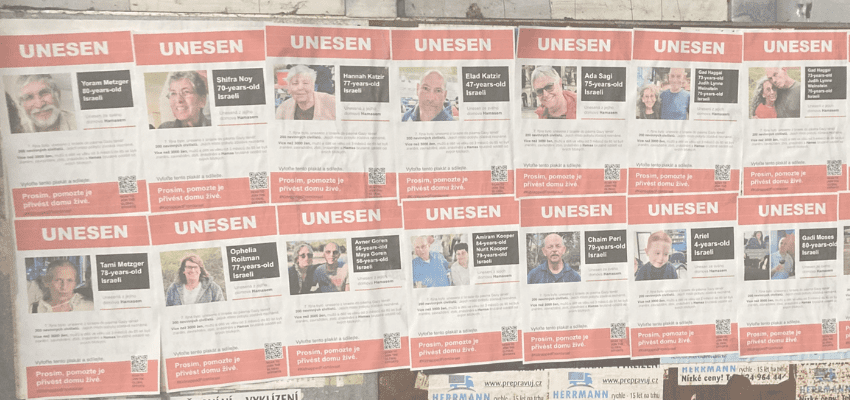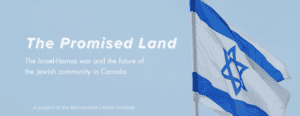By Tzvi Kahn, June 3, 2024
Canada must designate Iran’s Islamic Revolutionary Guard Corps (IRGC) as a terrorist organization pursuant to the Criminal Code. So declared the House of Commons on May 8. Again. Yet Prime Minister Justin Trudeau seems unwilling to listen. Again.
It’s a familiar story. In 2018, the House of Commons passed a non-binding motion by a vote of 248 to 45 calling on the government to face reality: The IRGC is a terrorist group that warrants designation under the Criminal Code. The IRGC, the motion stated, sponsors “terrorism around the world” and calls for “genocide against the Jewish people.”
Six years later, the House of Commons passed another non-binding motion – this time unanimously – repeating its call for the designation. Still, the prime minister shows no sign of assent.
But the case for designating the IRGC is even stronger today than it was six years ago. The IRGC lies at the root of the chaos that has engulfed the Middle East for the past seven months.
It was the IRGC that trained, funded, and armed Hamas, preparing the Gaza-based group for its massacre of nearly 1,200 Israelis – including several Israeli-Canadians – on October 7, 2023.
It was the IRGC that trained, funded, and armed Lebanon-based Hezbollah with more than 150,000 rockets and missiles, sharply escalating the risk of war. Since October 7, Hezbollah has already killed more than 20 Israeli soldiers in cross-border attacks. More than 80,000 residents of northern Israel have evacuated their homes.
It was the IRGC that trained, funded, and armed the Houthis in Yemen, who have conducted more than 50 strikes against commercial shipping in the Red Sea since November.
It was the IRGC that fired more than 300 missiles and drones at Israel last month. The air defense systems of Israel and allied nations shot down 99 percent of them, saving the Jewish state from catastrophe.
That’s not all. Consider the IRGC’s malign role in Iran itself.
It’s the IRGC that secures Iran’s nuclear infrastructure, which has recently brought the regime to the threshold of a nuclear weapons capability.
It’s the IRGC that controls Iran’s ballistic missile arsenal, which remains the largest in the Middle East.
It’s the IRGC that plays a key role in the Islamic Republic’s domestic repression, killing, torturing, and imprisoning countless protesters and other dissidents. The IRGC’s Basij militia helps enforce draconian laws that require women to wear the hijab, or headscarf, in public.
Trudeau knows all this – or should. At the very least, he grasps that Canada itself has legitimate grievances against the IRGC. After all, in 2020, the IRGC fired two surface-to-air missiles at Ukrainian International Airlines Flight PS752 three minutes after it departed a Tehran airport, killing all 176 people on board, including 85 Canadian citizens and permanent residents.
The IRGC has yet to hold its top leaders accountable despite their likely foreknowledge of the attack, instead blaming the tragedy on low-level functionaries in trials that lacked basic norms of transparency and due process.
Commendably, Trudeau’s rhetoric condemning the plane’s downing has been appropriate and clear. “The Flight PS752 tragedy happened because of the Iranian regime’s heinous disregard for human life,” he rightly declared last year. He has also repeatedly expressed solidarity with the Iranian people and denounced Tehran’s human rights abuses.
Most strikingly, in a memorial for the victims of Flight PS752 earlier this year, he said, “We will continue our work, including continuing to look for ways to responsibly list the IRGC as a terrorist organization.”
Well, he has been looking for an awfully long time. More than four years have passed since the downing of Flight PS752. In the interim, the IRGC’s regional aggression and domestic repression have only intensified, most notably since October 7. Trudeau’s unwillingness to match his words with meaningful action effectively denies justice to the passengers of PS752.
An IRGC designation pursuant to the Criminal Code is easily the most powerful tool in Ottawa’s legal arsenal. As the Canadian Coalition Against Terror notes, a designation would – among other penalties – subject the designee’s property to seizure; prohibit certain financial transactions with the designee; and dramatically increase prison sentences and fines for those who facilitate a designee’s terrorist activity.
Yet the federal government’s inaction is alarming not only because it emboldens Tehran, but also because it suggests the prime minister fails to appreciate that Canada constitutes merely one front in a larger confrontation between Iran and the West.
Iran seeks to terrorize Canada for the same reason it seeks to terrorize Israel, the United States, and the Middle East: to weaken Western resolve, project power, and ultimately dominate the region and beyond. Ottawa cannot disaggregate Iran’s belligerence toward its neighbours and its own people from its belligerence against Western countries like Canada.
By imposing meaningful punishments on the IRGC, Trudeau not only would further isolate Tehran, but would implicitly affirm Canada’s determination to punish the regime for the totality of its malign conduct – and to ally itself with the larger Western struggle against Iran, particularly in the wake of October 7.
The United States, Canada’s closest ally, designated the IRGC as a foreign terrorist organization in 2019, a year before the downing of Flight PS752. At the time, Washington declared – echoing language that appeared in the House of Commons’ 2018 motion – that the move sought “to counter Iran-backed terrorism around the world.” Ottawa should target the IRGC with a similar goal in mind.
The Canadian people have spoken. If Trudeau remains unwilling to heed the House of Commons, he should not be surprised if Iran targets Canada. Again.
Tzvi Kahn is a research fellow and senior editor at the Foundation for Defense of Democracies. Follow him on X @TzviKahn.







